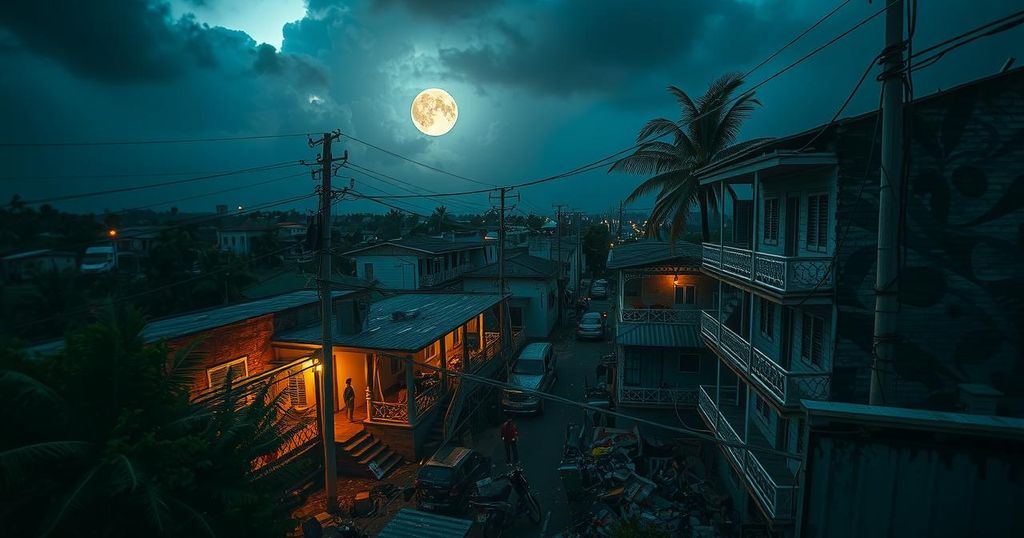Cuba Faces Ongoing Power Crisis Amidst Hurricane Oscar Threat
Cuba is experiencing a prolonged power outage affecting millions, occurring simultaneously with Hurricane Oscar’s approach. The country’s electrical grid has suffered multiple failures since Friday, leading to continuous blackouts and social unrest. As residents cope with the crisis, officials face challenges in restoration efforts amidst the impending storm.
As Hurricane Oscar approaches Cuba, millions of citizens have faced a third consecutive day without electrical power, exacerbating an already dire situation. The Cuban Electrical Union reported that approximately 16% of the country had power restored, but the aging energy infrastructure encountered issues once again late Saturday, leading to another outage. This is the third nationwide blackout since Friday, following a failure at one of the major power plants. Most of the island’s ten million inhabitants have experienced continuous power interruptions since then. Compounding the challenges, Hurricane Oscar, which made landfall on Inagua Island in the Bahamas with sustained winds reaching 80 mph, is forecasted to strike Cuba’s northeastern coast later today. While a weakening of the storm is anticipated following landfall, it may still pose risks as it moves north of Cuba on Monday, potentially transforming into a tropical storm before crossing the central Bahamas on Tuesday. The cascading effects of the blackouts extend beyond power outages, threatening vital water supply systems and food preservation efforts dependent on stable electricity. In urban areas like Havana, citizens have resorted to utilizing social media platforms such as WhatsApp to report updates on power availability and to coordinate the refrigeration of critical medications among those fortunate enough to temporarily have power or possess generators. Long lines formed outside bakeries in Havana as residents waited for hours to purchase limited supplies of bread, leading to disputes among frustrated shoppers. The societal strain prompted citizens to question the absence of support from Cuba’s traditional allies, like Venezuela, Russia, and Mexico—all of which have previously provided essential oil resources necessary for energy stability. Despite the disruptions, tourists have been observed navigating Havana in classic vehicles; however, many hotels have succumbed to power outages as their generators have depleted fuel. Reports indicated that the José Martí International Airport in Havana has relied on emergency power, resulting in operational limitations such as non-functional printers for issuing tickets and the absence of air conditioning in the terminal. Recent protests indicate rising discontent among residents, as they confront the ramifications of the energy crisis, which officials attribute to a combination of U.S. economic sanctions, infrastructure deficiencies, and the impacts of recent hurricanes. Cuban Prime Minister Manuel Marrero Cruz acknowledged the situation in a televised address, stating, “We have been paralyzing economic activity to generate (power) to the population.” The health minister confirmed that healthcare facilities are functioning on auxiliary generators, ensuring ongoing provision of essential services.
Cuba has faced severe challenges in maintaining its electrical grid, particularly in the context of recent natural disasters and economic pressures. The energy crisis has led to widespread blackouts, affecting the daily lives of millions and raising concerns over the country’s infrastructure. The arrival of Hurricane Oscar, which threatens to bring further destruction, complicates the recovery efforts already hampered by the deteriorating state of the energy network. Additionally, the socioeconomic implications of prolonged blackouts affect basic services and food supply, prompting citizens to express their frustrations through social media and protests. The government’s response, including the invocation of traditional alliances for support, underscores the multi-layered struggles faced by the nation.
In summary, Cuba is grappling with an escalating energy crisis marked by extensive blackouts affecting millions of residents, compounded by the impending threat of Hurricane Oscar. The failure of the electrical infrastructure has disrupted essential services and led to public unrest, as citizens seek clarity and support from their government and allies. Without immediate solutions to restore power and address the deteriorating conditions, the situation may continue to deteriorate, highlighting the urgent need for reforms and assistance.
Original Source: www.cnn.com




Post Comment